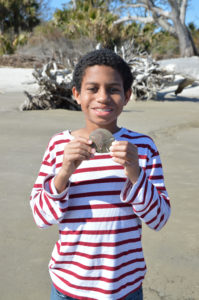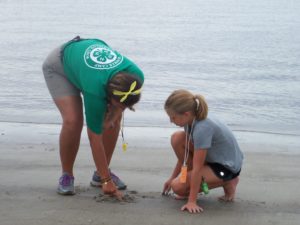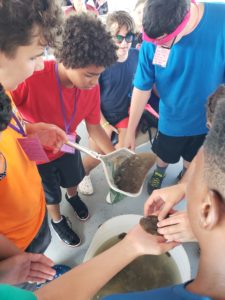How to Book Your Group
Georgia 4-H at Camp Jekyll operates its day and residential environmental education programs from September through May of each school year. Our facility can accommodate up to 256 people in our cabins for a residential program. We are currently accepting reservations for the current 2025-26 school year. The books typically open for reservations each August for the next school year (a year in advance). Camp Jekyll offers priority booking for schools and educators who have participated for 20 or more years (2-day early access) and also 10 or more years (1-day early access) with our GA 4-H Environmental Education Program as a way to say thank you:
• For educators/schools that have attended for 20 or more years, the reservation books for 2026-2027 will open on Monday, August 18th, 2025 at 8:00am. If you are unsure if you qualify for priority booking, please give us a call beforehand to confirm.
• For educators/schools that have attended for 10 or more years, the reservation books for 2026-2027 will open on Tuesday, August 19th, 2025 at 8:00am. If you are unsure if you qualify for priority booking, please give us a call beforehand to confirm.
• For educators/schools that have attended for less than 10 years or have never attended a GA 4-H EE Program at GA 4-H Center, the reservation books for 2026-2027 will open on Wednesday, August 20th, 2025 at 8:00am.
Please be sure sure to call as emails will be processed after all phone calls have been managed. Scheduling a field study involves many variables, and your choices may be limited by the availability of dates. Before you commit to a date, be sure to review the school calendar to consider your school’s dates for grade level events, sporting events, holidays, breaks, testing, teacher work days, and any other school functions.
What Month Is Best?
Early Fall (September – October)
· Weather is warm, but it’s still hurricane season and can be rainy.
· The sand gnats aren’t usually biting, but the mosquitoes can be.
· All classes are offered this time of year.
· Students and teachers can bond early on, but fundraising needs to happen quickly.
· Students are motivated and ready to learn.
· Information can be a great preview for lessons all year long.
· Doesn’t usually conflict with school/system/state testing.
Late Fall (November – December)
· Weather can be cooler, layers are necessary to be comfortable in classes.
· The mosquitoes aren’t usually biting, but the sand gnats can be.
· The water and air temperature are too cool to offer seining and nets.
· It’s darker earlier in the evenings which makes campfire and night walks extra fun!
· Students are motivated and ready to learn, but also anxious for the holidays.
· Doesn’t usually conflict with school/system/state testing.
Early Spring (January – March)
· Weather is variable, so you have to come prepared for warm and cold.
· Insects aren’t usually a problem (maybe sand gnats on a warm day)
· It’s plenty dark for campfires and night walks.
· Seining and nets is still not offered (air and water too cool).
· Students and teachers are very comfortable with each other and know the routines.
· Can be a nice break between winter holidays and spring break.
· Doesn’t usually conflict with school/system/state testing.
Late Spring (April – May)
· Weather is warmer (can be windy), and can even be hot!
· Afternoon thunderstorms are a possibility.
· Insects depend on temperature (sand gnats cooler, mosquitoes warmer)
· Campfire and night walks are more difficult as it stays lighter later at night.
· Seining and nets begins again sometime in April when water temps warm up.
· Swimming becomes more of a temptation for students, but is not allowed!
· Can conflict with school/system/state testing, be sure to check calendar.
· Great end of the year field study!
Reservation Contact Information
550 S. Beachview Drive,
Jekyll Island, GA 31527
Office Phone: (912) 635-4117
Fax: (912) 635-5019
Email: andi.corcelli@uga.edu
Office Hours: 8 am – 5 pm, Monday – Friday (voice mail 24 hours a day, 7 days a week)
Contract, Deposit, & Incurred Cost
Notes on Transportation
We also strongly recommend that all groups bring at least one vehicle such as a personal car (not a bus) in case of minor emergencies and for personal convenience. We are located approximately 20 minutes from Brunswick, and minor injuries and/or illnesses that require a doctor may result in teachers being gone for several hours. Of course, any participant with life threatening emergencies can be transported to the nearest medical facility by a local ambulance/EMS dispatched from the Jekyll Island Fire Station.









